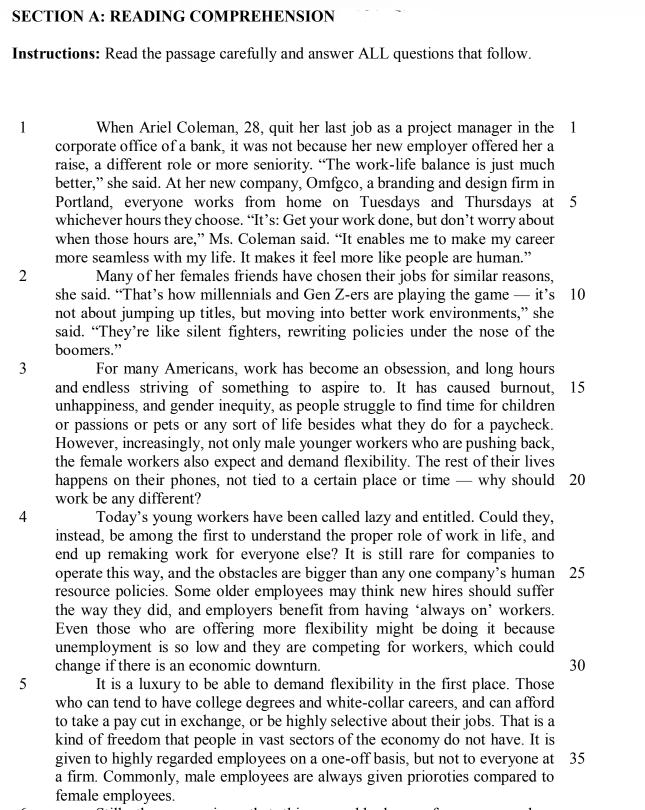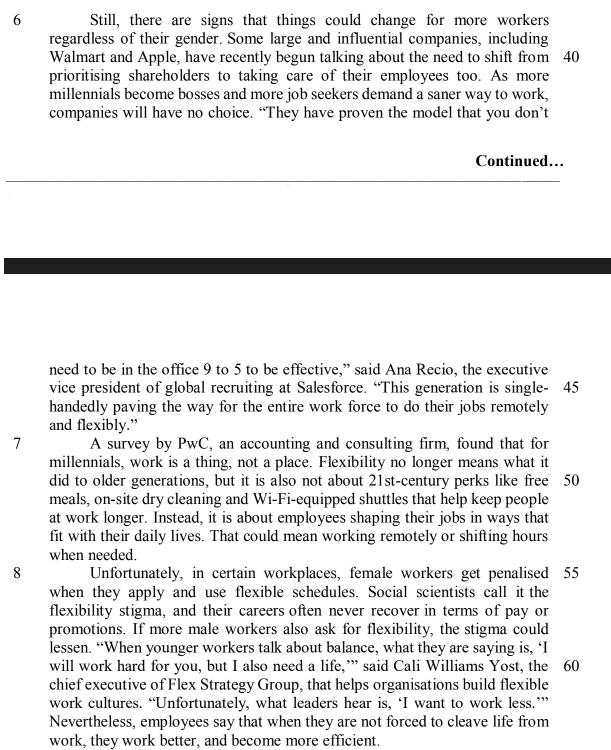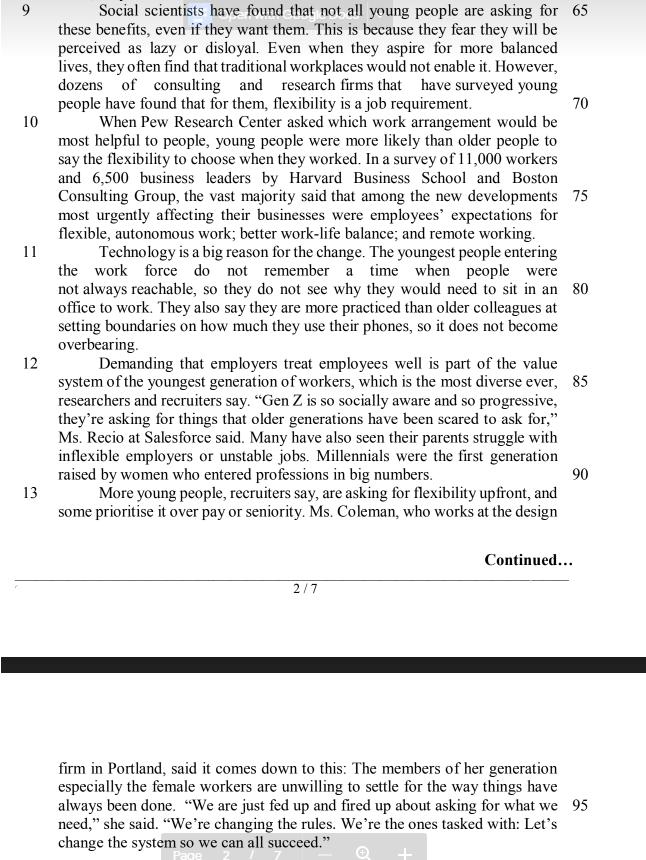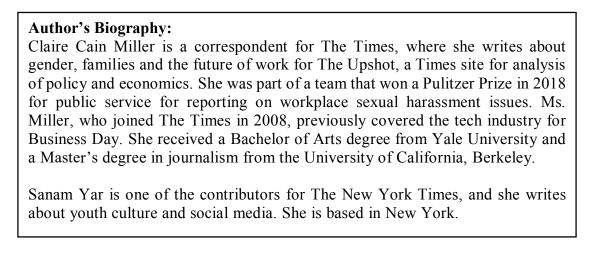Answered step by step
Verified Expert Solution
Question
1 Approved Answer
SECTION A: READING COMPREHENSION Instructions: Read the passage carefully and answer ALL questions that follow. 1 When Ariel Coleman, 28, quit her last job





SECTION A: READING COMPREHENSION Instructions: Read the passage carefully and answer ALL questions that follow. 1 When Ariel Coleman, 28, quit her last job as a project manager in the 1 corporate office of a bank, it was not because her new employer offered her a raise, a different role or more seniority. "The work-life balance is just much better," she said. At her new company, Omfgco, a branding and design firm in Portland, everyone works from home on Tuesdays and Thursdays at 5 whichever hours they choose. "It's: Get your work done, but don't worry about when those hours are," Ms. Coleman said. "It enables me to make my career more seamless with my life. It makes it feel more like people are human." 2 Many of her females friends have chosen their jobs for similar reasons, she said. "That's how millennials and Gen Z-ers are playing the game it's 10 not about jumping up titles, but moving into better work environments," she said. "They're like silent fighters, rewriting policies under the nose of the boomers." 3 For many Americans, work has become an obsession, and long hours and endless striving of something to aspire to. It has caused burnout, 15 unhappiness, and gender inequity, as people struggle to find time for children or passions or pets or any sort of life besides what they do for a paycheck. However, increasingly, not only male younger workers who are pushing back, the female workers also expect and demand flexibility. The rest of their lives happens on their phones, not tied to a certain place or time why should 20 work be any different? 4 Today's young workers have been called lazy and entitled. Could they, instead, be among the first to understand the proper role of work in life, and end up remaking work for everyone else? It is still rare for companies to operate this way, and the obstacles are bigger than any one company's human 25 resource policies. Some older employees may think new hires should suffer the way they did, and employers benefit from having 'always on' workers. Even those who are offering more flexibility might be doing it because unemployment is so low and they are competing for workers, which could change if there is an economic downturn. 30 5 It is a luxury to be able to demand flexibility in the first place. Those who can tend to have college degrees and white-collar careers, and can afford to take a pay cut in exchange, or be highly selective about their jobs. That is a kind of freedom that people in vast sectors of the economy do not have. It is given to highly regarded employees on a one-off basis, but not to everyone at 35 a firm. Commonly, male employees are always given prioroties compared to female employees. 6 Still, there are signs that things could change for more workers regardless of their gender. Some large and influential companies, including Walmart and Apple, have recently begun talking about the need to shift from 40 prioritising shareholders to taking care of their employees too. As more millennials become bosses and more job seekers demand a saner way to work, companies will have no choice. "They have proven the model that you don't Continued... need to be in the office 9 to 5 to be effective," said Ana Recio, the executive vice president of global recruiting at Salesforce. "This generation is single- 45 handedly paving the way for the entire work force to do their jobs remotely and flexibly." 7 A survey by PwC, an accounting and consulting firm, found that for millennials, work is a thing, not a place. Flexibility no longer means what it did to older generations, but it is also not about 21st-century perks like free 50 meals, on-site dry cleaning and Wi-Fi-equipped shuttles that help keep people at work longer. Instead, it is about employees shaping their jobs in ways that fit with their daily lives. That could mean working remotely or shifting hours when needed. 8 Unfortunately, in certain workplaces, female workers get penalised 55 when they apply and use flexible schedules. Social scientists call it the flexibility stigma, and their careers often never recover in terms of pay or promotions. If more male workers also ask for flexibility, the stigma could lessen. "When younger workers talk about balance, what they are saying is, 'I will work hard for you, but I also need a life," said Cali Williams Yost, the 60 chief executive of Flex Strategy Group, that helps organisations build flexible work cultures. "Unfortunately, what leaders hear is, 'I want to work less."" Nevertheless, employees say that when they are not forced to cleave life from work, they work better, and become more efficient. 9 Social scientists have found that not all young people are asking for 65 these benefits, even if they want them. This is because they fear they will be perceived as lazy or disloyal. Even when they aspire for more balanced lives, they often find that traditional workplaces would not enable it. However, dozens of consulting and research firms that have surveyed young people have found that for them, flexibility is a job requirement. 70 10 When Pew Research Center asked which work arrangement would be most helpful to people, young people were more likely than older people to say the flexibility to choose when they worked. In a survey of 11,000 workers and 6,500 business leaders by Harvard Business School and Boston Consulting Group, the vast majority said that among the new developments 75 most urgently affecting their businesses were employees' expectations for flexible, autonomous work; better work-life balance; and remote working. 11 Technology is a big reason for the change. The youngest people entering the work force do not remember a time when people were not always reachable, so they do not see why they would need to sit in an 80 office to work. They also say they are more practiced than older colleagues at setting boundaries on how much they use their phones, so it does not become overbearing. 12 Demanding that employers treat employees well is part of the value system of the youngest generation of workers, which is the most diverse ever, 85 researchers and recruiters say. "Gen Z is so socially aware and so progressive, they're asking for things that older generations have been scared to ask for," Ms. Recio at Salesforce said. Many have also seen their parents struggle with inflexible employers or unstable jobs. Millennials were the first generation raised by women who entered professions in big numbers. 90 13 More young people, recruiters say, are asking for flexibility upfront, and some prioritise it over pay or seniority. Ms. Coleman, who works at the design Continued... 2/7 firm in Portland, said it comes down to this: The members of her generation especially the female workers are unwilling to settle for the way things have always been done. "We are just fed up and fired up about asking for what we 95 need," she said. "We're changing the rules. We're the ones tasked with: Let's change the system so we can all succeed." Author's Biography: Claire Cain Miller is a correspondent for The Times, where she writes about gender, families and the future of work for The Upshot, a Times site for analysis of policy and economics. She was part of a team that won a Pulitzer Prize in 2018 for public service for reporting on workplace sexual harassment issues. Ms. Miller, who joined The Times in 2008, previously covered the tech industry for Business Day. She received a Bachelor of Arts degree from Yale University and a Master's degree in journalism from the University of California, Berkeley. Sanam Yar is one of the contributors for The New York Times, and she writes about youth culture and social media. She is based in New York. Based on the article, evaluate and justify on the author's objectivity. Based on the author's biography, evaluate and justify on the author's credibility.
Step by Step Solution
★★★★★
3.47 Rating (154 Votes )
There are 3 Steps involved in it
Step: 1
Based on the article evaluate and justify on the author s object ivit...
Get Instant Access to Expert-Tailored Solutions
See step-by-step solutions with expert insights and AI powered tools for academic success
Step: 2

Step: 3

Ace Your Homework with AI
Get the answers you need in no time with our AI-driven, step-by-step assistance
Get Started


